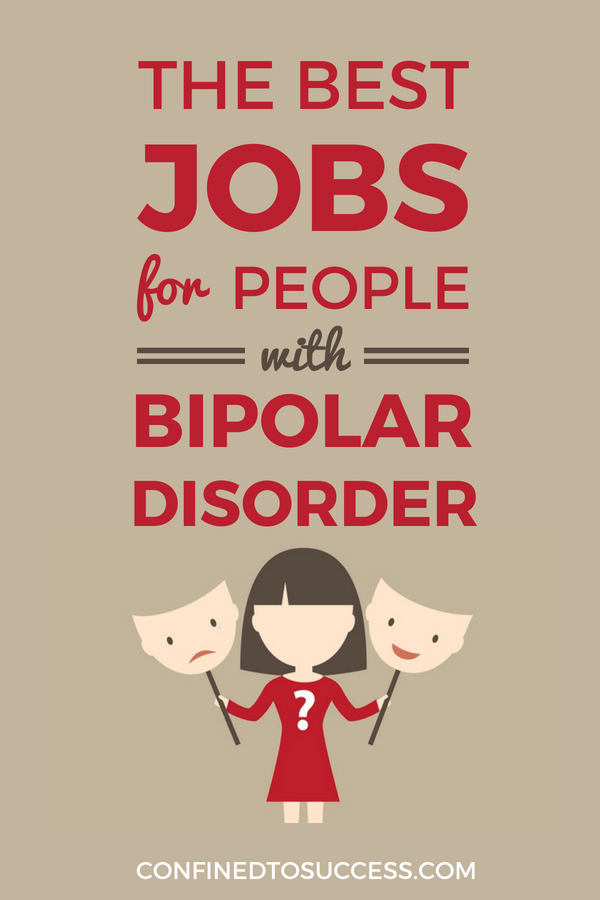Best Jobs For People With Bipolar Disorder (And Worst Jobs)

Living with bipolar disorder can be a constant struggle, even more so when you factor in a job. No doubt, the physical and emotional burden weighing on bipolar disorder sufferers can make finding and keeping a conventional job a difficult and overwhelming task. But getting a job you can handle doesn’t have to be so difficult if you can find work that allows you to manage your own time.
If your current job isn’t as rewarding as you’d hoped, or the difficulties and stresses of your job have you feeling like you’re on a constant roller coaster, taking a look at the patterns of your emotional cycle may help you identify more rewarding ways to make money and live a healthier lifestyle.
In this post, we’ll describe what you ought to know when working a job with bipolar disorder as well as some recommendations for possible career paths. But first, let’s start with some basics…
WHAT IS BIPOLAR DISORDER?
According to the National Alliance of Mental Illness (NAMI), about 2.6% of adults in the United States live with bipolar disorder. [source] Also known as manic-depressive illness, bipolar disorder is characterized by episodes of extreme highs and lows or alternating shifts in moods and energy levels, making it difficult to do even mundane daily tasks. There are four main types of this neurological condition:
Cyclothymia or Cyclothymic Disorder – This condition is characterized by symptoms that have lasted for at least two years and include recurring periods of depressive and hypomanic episodes.
Bipolar I Disorder – This complex diagnosis shows symptoms of depressive or manic episodes that occur for at least seven days. These episodes may be severe and require hospital care. There may also be an occurrence with “mixed features” or simultaneous feelings of manic and depressive symptoms.
Bipolar II Disorder – This condition is a less severe version of the Bipolar I Disorder and includes many of the same symptoms.
Other Specified and Unspecified Bipolar and Related Disorders – This is a kind of catch-all category for those who experience bipolar disorder symptoms but don’t fall into any of the above diagnoses.
Typical symptoms of bipolar disorder may include alternating periods of emotional episodes like mood swings, impulsivity, racing thoughts, anxiety, and sadness. There may also be “mood episodes” that include changes in sleeping patterns or risk-taking behavior.
Other manic symptoms may include:
- Feeling irritable or having a short fuse
- Fast speech pattern
- Trouble sleeping
- Having a lot of projects going at the same time
- Racing thoughts
- Delusional or unwanted thoughts
Depressive episode symptoms may include:
- Feeling very tired, lethargic, or even sick
- Feelings of hopelessness
- Feeling worried or anxious
- Trouble with concentration and completing tasks
- Forgetfulness
Getting a proper diagnosis from a health professional is an important first step in your recovery. Your doctor may suggest a complete examination with blood tests, neurological tests, and an MRI of your brain to rule out other possible diagnoses.
Now, besides taking the right medications and others treatments from your doctor, there are other steps you can take to avoid triggering symptoms on the job, starting with giving consideration to the work conditions…
WORST WORK CONDITIONS FOR PEOPLE WITH BIPOLAR DISORDER
Stressful work conditions with a fast-paced environment and tight deadlines aren’t advised for people with bipolar disorder. Also, jobs with long or unpredictable hours may make it difficult for someone with mental health issues like bipolar disorder to take a step back and re-energize his/her well-being.
To avoid these scenarios, you may want to consider avoiding the following work conditions to keep from triggering an unhealthy episode:
- High stress or fast-paced environments
- Difficult management or boss
- Unpredictable hours or short-notice weekend work that impact your sleep cycle [source]
- Irregular paychecks
- Work with a lot of travel
Given these undesirable work conditions, what specific jobs should you try to avoid? Well, that depends on you and your understanding of what tends to upset your emotional cycle. But here are some jobs you may want to cross off your list right away…
WORST JOBS FOR PEOPLE WITH BIPOLAR DISORDER
Bartender – Combined with the night time job hours and the proximity to alcohol, being a bartender has a very high potential to create unwanted pressures and temptation.
Customer Service Representative – While a career in customer service can be a rewarding experience for some, there remains a possibility that talking to people who are upset about a company’s service or product can take its toll on you and create a high potential for depression.
Salesperson – Since many people work on commission, there’s an element of uncertainty to what your monthly paycheck will look like. Also, the possibility of long hours and the pressure to meet sales goals may create unhealthy anxiety and concern for long-term future prospects.
Nursing – This medical profession carries long hours of working on your feet and working with people who are sick or chronically ill. Over time, this can wear you down and prevent you from focusing on your own well-being.
Social Work – While social work is an admirable job that helps many people, you may encounter situations of child abuse, neglect, poverty, and drug addiction. This can create burnout on the mind and body over a period of time.
TIPS TO HELP YOU BETTER COPE WITH YOUR WORK DAY
Even jobs well suited to those with bipolar disorder can still pose challenges even during the best of times. So, here are some recommendations to help you get through the work day:
- Take Time to Reset Your Mind — From taking a bubble bath to taking a tai chi class to going on a long walk with your dog, there are a number of ways to regroup and regain your mental strength for the work days ahead. Be sure to carve out some time to take care of yourself and do things that offer you peace and enjoyment.
- Follow Your Treatment Plan – Taking charge of your health and following a treatment plan from a knowledgeable and trusted health professional will help keep you on track. Take your medications as prescribed and see your medical professional if you notice a change in your symptoms or if your meds aren’t working for you.
- Keep a Daily Routine That Includes Plenty of Sleep – Having a consistent structure in your daily routine is extremely important in managing your illness. Also, staying on a regular sleep schedule can help keep your circadian rhythm stable and protect you from potential stressors.
- Pay Attention to Diet – Consuming things like junk food and alcohol can make a big difference in how you feel. Avoiding possible food and chemical triggers that lead to an emotional downward spiral may help keep you on an even keel. [source]
- Build a Support Network – Work-related responsibilities can be overwhelming and cause anxiety. Having one or more people in your life you can turn to for support can help relieve some of the pressures of day-to-day living. Finding the right support network can take time and it may be difficult to open up about your condition, but having people to help you cope can go a long way in relieving the burdens of your work.
For general tips on how to cope with a job when you’re disabled or chronically ill, check out this post.
THE BEST JOBS FOR PEOPLE WITH BIPOLAR DISORDER
Generally, the best jobs for people with bipolar disorder are ones that allow you the freedom to work when you have the energy and avoid situations that may put you in a downward spiral. In order for you maximize your chances of success you need to in some way, be your own boss or have enough freedom where you don’t feel confined. Some potential career opportunities may include:
Building Your Own Business – Becoming an independent contractor offers a lot of flexibility, allowing you to choose a field you enjoy.
Affiliate Marketing – This is the ideal business model and income source for someone with bipolar disorder. The idea here is to refer different types of services and products to potential online customers where you make commissions from successful conversions. This path offers plenty of freedom as it allows you to create a schedule that works for you. If you choose to go down this road, you need to know what you’re doing to maximize success. Affiliate marketing is a skill, but once you learn it you will have it for life and can be very financially rewarding. Click HERE to learn more.
Working With Animals – Studies have shown that working with animals can help control mood swings and keep you from getting depressed. [source] Job opportunities like walking dogs, pet-sitting, or training dogs for pet therapy can be a very fulfilling career.
Hair Stylist – Becoming a hair stylist gives you an opportunity to let your mind be creative. You may be able to create a flexible schedule and having many different clients allows you to be artistic. [source]
Besides these examples, a home-based job may be another possibility worth considering. Not only can it pay your monthly expenses, it can also allow you the freedom to work in a flexible environment. There are many ways to make a good living while working at home, including the following:
Freelance Writing – You can find lots of opportunities online for freelance writing such as on platforms like Upwork and Freelancer. This choice allows you to set your own schedule to work when you want and build your client base over time. And if you want the potential to make a great salary, give special attention to copywriting in particular [source]. Click here to learn more about how to become a freelance writer online.
Consulting – If you have a special gift or skill such as web design, video editing, or doing voice-overs, why not share it with others while getting paid? Independent consulting can be a very lucrative business with a flexible schedule.
Survey Taker – We’ve all seen these opportunities online and sure, survey taking doesn’t yield big money, but with some dedication, you could bring in a few hundred dollars per month. (If you want to learn more about taking surveys, my dedicated guide can help.)
NOW IT’S YOUR TURN!
What jobs for people with bipolar disorder would you recommend? How have you dealt with bipolar disorder in the workplace in the past? Leave your comments below!







